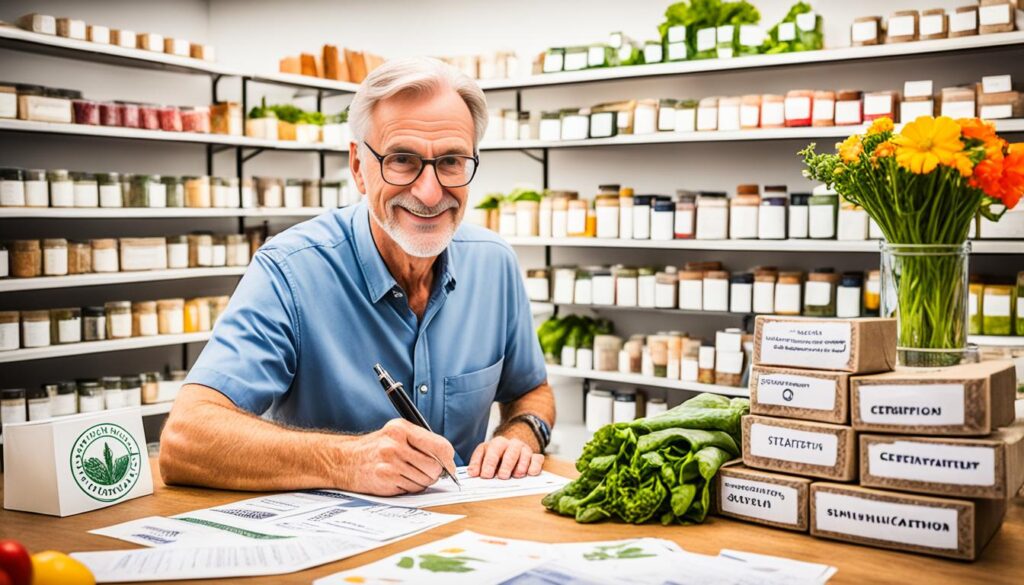Getting Certified Organic: Steps and Benefits
Are you ready to elevate your gardening to new levels and enjoy the perks of organic certification? Going organic means you’re choosing sustainable and eco-friendly gardening. This choice protects the environment and can make your business more attractive. But what does it take to get certified, and how can it help you? Let’s dive into the steps to become USDA certified organic and see the big benefits that come with it.
Key Takeaways
- Organic certification shows your gardening or farming meets USDA organic standards.
- The process has five main steps, like making an organic plan and getting inspected on-site.
- Getting USDA certified organic brings many benefits for the environment, health, and your business.
- Knowing about the costs and the three-year transition period helps plan your organic journey.
- Picking the right certifying agent is key for a smooth organic certification process.
Understanding Organic Certification
Organic certification is key for farms and businesses wanting to follow sustainable and clear practices. It’s a third-party check that makes sure they meet USDA organic rules. This builds trust with consumers and helps products stand out.
What is Organic Certification?
Getting organic certified means keeping detailed records, passing inspections, and getting an accredited agent’s review. It shows a producer’s promise to care for the environment and farm ethically. This leads to the USDA organic seal, a mark of quality.
Why Pursue Organic Certification?
Going for organic certification has big perks for both farmers and buyers. It shows a commitment to farming the right way, like using natural fertilizers and managing pests wisely. It also meets the growing need for products that are good for the planet and our health.
“Organic certification builds consumer trust and demonstrates a commitment to transparency and environmental stewardship.”
Getting certified can also open up new sales chances. Many stores and buyers look for organic products. With the USDA organic label, producers can stand out and earn more, helping the organic market grow.
In short, organic certification is a detailed process that checks if producers follow USDA organic rules. It lets them benefit from the growing desire for sustainable and honest farming.
The Five-Step Certification Process
Getting organic certification is a detailed process with several steps. If you’re a producer or handler, you must follow a specific process. This shows you meet USDA organic rules.
Step 1: Develop an Organic System Plan
The first step is making a detailed organic system plan. This plan shows how you’ll follow organic standards. It covers approved substances, monitoring, and preventing contamination. Your plan is the base of your certification.
Step 2: Implement the Organic System Plan
After making your plan, it’s time to act on it. You must follow the plan’s practices and keep records. This proves you’re following USDA organic rules.
Step 3: Undergo an On-Site Inspection
A USDA-accredited agent will inspect your site next. They’ll check your records, practices, and risks. This ensures you meet organic standards.
“The on-site inspection is a crucial step in the organic certification process, allowing the certifying agent to verify that your operation is truly adhering to organic practices.”
After these first three steps, you’re ready for the next part of the process. The certifying agent will review your application. Then, they’ll make a final decision on your organic certification.
organic certification
Getting into USDA organic certification might seem hard, but it’s actually a detailed process. It’s all about keeping the organic label honest. At the core, USDA-accredited certifying agents make sure everything meets the organic rules. They check if farms, businesses, or facilities can call their products USDA certified organic.
The first step is making an organic system plan. This plan shows how you farm or handle products in a green way. You must follow this plan closely. Then, a certifying agent will check your work in person to make sure you’re following the organic regulations.
After the check, the certifying agent looks over the results and decides if you get the organic label. This last step makes sure your products and methods are up to the USDA’s high standards. If they are, you get the organic seal of approval.
Getting through the certification process might look tough, but with help from a USDA-accredited certifying agent, you can do it. By sticking to sustainable farming and being open, you’ll not only get organic benefits but also help the planet and people.
“Organic certification is not just a label – it’s a commitment to sustainable practices that benefit both the land and the consumer.”
The Pillars of Organic Certification
- Comprehensive Organic System Plan
- Meticulous On-Site Inspections
- Rigorous Compliance with Organic Regulations
- Final Approval from USDA-Accredited Certifying Agent
| Key Steps in the Organic Certification Process | Description |
|---|---|
| Develop Organic System Plan | Outline sustainable farming or handling practices |
| Implement Organic System Plan | Consistently apply the practices detailed in the plan |
| Undergo On-Site Inspection | Comprehensive review of operations by certifying agent |
| Receive Certification Decision | Certifying agent evaluates findings and grants approval |
Review and Decision by Certifying Agent
After the on-site inspection, the certifying agent looks over the inspection report. They check if your operation meets the USDA organic regulations. They look for any risks of contamination. They might ask for more tests or documents.
Step 4: Certifying Agent Evaluates Inspection Report
The certifying agent checks the inspector’s work closely. They make sure your operation meets all organic certification rules. This careful check is key to keeping the USDA organic seal trusted by consumers.
Step 5: Receive Organic Certification Decision
- If your operation shows it follows the organic rules, you get an official organic certificate from the certifying agent.
- This lets you sell your products as USDA certified organic. It also opens up new marketing advantages and more customers.
- To keep your organic status, you must go through an annual review and inspection. This checks if you’re still following the rules.

“Earning the USDA organic seal is a badge of honor, signifying your commitment to sustainability and transparency. It’s a decision that can elevate your business and set you apart in the market.”
Maintaining Organic Certification
Getting organic certification is just the start of your journey in sustainable farming. To keep your USDA organic certification, you must follow strict USDA organic rules. You need to have an annual check and inspection by your certifying agent. This makes sure your farm still meets the organic standards.
Keeping detailed records is key to keeping your organic certification. You must track everything from picking seeds to selling your products. These records show your strong commitment to organic farming. They also help your certifying agent check if you’re following the rules during inspections.
- Implement approved organic practices consistently
- Prevent any potential contamination or commingling of organic and non-organic products
- Maintain comprehensive records of all your organic activities
- Undergo an annual on-site inspection by your certifying agent
By sticking to USDA organic rules and taking part in yearly inspections, you can keep your organic certification going strong. This effort not only keeps your products pure but also builds trust with consumers who see the USDA organic seal.
“Maintaining organic certification is an ongoing journey, but the rewards of sustainable, eco-friendly agriculture are well worth the effort.”
Cost of Organic Certification
Getting organic certification can cost a lot upfront, but it’s worth it in the long run. The cost depends on your farm’s size and the certifier you pick. You’ll need to pay for the application and renewal fees, as well as the cost of inspections.
Application and Renewal Fees
The first step is a one-time application fee. This can be anywhere from $400 to $900 or more. After you’re certified, you’ll pay yearly renewal fees. These fees are usually a small percentage of your organic sales, like 0.5% to 2%.
Inspection Costs
You’ll also need to pay for on-site inspections, which are key to getting certified. These fees can be quite different, but they usually fall between $500 to $1,500 or more. The size of your farm, its complexity, and the inspector’s travel costs can affect the price.
But don’t worry, the USDA has programs to help with these costs. If you’re eligible, you could get up to 75% back on your organic certification cost. This includes application fees, renewal fees, and inspection costs.
| Fee Type | Typical Range |
|---|---|
| Application Fees | $400 – $900+ |
| Renewal Fees | 0.5% – 2% of organic production value |
| Inspection Costs | $500 – $1,500+ |

“The costs of organic certification can be a significant investment, but the long-term benefits of accessing the growing organic market and demonstrating your commitment to sustainability can more than make up for the upfront expenses.”
Transitioning to Organic Farming
Switching to organic farming is rewarding but also challenging. The USDA requires a three-year transition period before you can call your farm organic. During this time, you can’t use certain substances on your land. After three years, you can’t sell your products as “organic” or use the USDA organic seal.
The Three-Year Transition Period
The organic transition might seem tough, but the USDA offers help. Programs like EQIP give financial assistance and technical guidance to those starting their organic journey.
During the three years, you must create and follow an organic system plan. This plan must meet USDA organic regulations. You’ll keep detailed records of your farming methods and inputs to show you’re serious about going organic.
After three years, you can apply for full organic certification. Getting certified lets you market your products as “organic.” It also opens doors to reach customers who prefer organic products and helps your brand stand out.
Benefits of Organic Certification
Getting organic certification brings many advantages for producers, consumers, and the planet. It helps with environmental sustainability and boosts health and wellness. This seal makes products stand out in stores.
Environmental Benefits
Organic farming focuses on soil health, biodiversity, and saving water. It avoids synthetic chemicals, reducing harm to the environment. This helps keep natural resources safe for the future.
Health Benefits
Organic products don’t have harmful chemicals. They offer a healthier choice for consumers. Organic means using natural methods and safe ingredients, meeting the need for health-focused choices.
Marketing Advantages
The organic seal is a strong selling point, building trust with those who care about health. It shows your commitment to the planet and health. This can lead to higher prices and a unique spot in the market, increasing trust and making you stand out.
| Benefit | Description |
|---|---|
| Environmental Sustainability | Organic farming practices promote soil health, biodiversity, and water conservation, while avoiding synthetic pesticides and fertilizers. |
| Health and Wellness | Organic products are free from harmful chemicals, providing consumers with a healthier and more nutritious alternative. |
| Market Differentiation | The organic seal builds trust and credibility, allowing producers to command premium prices and stand out in a crowded marketplace. |
| Consumer Trust | Organic certification showcases a commitment to sustainable and healthy practices, appealing to health-conscious consumers. |
Choosing organic certification benefits opens doors to new chances. It meets the need for products that are good for the planet and our health. It helps your business grow and supports a greener future.
Choosing a Certifying Agent
Choosing the right certifying agent is key to organic certification. The United States Department of Agriculture (USDA) accredits many certifying agents. They offer certification services suited for organic producers.
When starting your organic journey, think about the agent’s reach, their knowledge of your operation, and their skill in international standards and certification. Also, consider the cost and quality of their services.
Working with a trusted organic certification agency ensures a smooth certification process. It helps meet USDA requirements and follow organic rules.
“Choosing the right certifying agent is essential for a seamless organic certification journey. Their expertise and guidance can make all the difference in achieving and maintaining your organic status.”
To find the best USDA-accredited certifier, check out the [https://www.organiccertifiers.com/] website. It has lots of info and a directory of certified organic operators. Researching and picking the right agent will help you enjoy organic certification benefits.
Resources for Organic Certification
Starting your journey to organic certification? You’ll find many resources to help you. The USDA Organic Portal, along with guides and manuals, is here for you. These tools are great for both new and experienced organic farmers.
USDA Organic Portal
The USDA Organic Portal is your go-to for organic certification. It has all the info on organic rules, what you need for certification, and even help with costs. Checking out the USDA Organic Portal can really change the game for you.
Certification Guides and Manuals
There are also guides and manuals from certifying agents. They explain how to get certified step by step. They cover everything from paperwork to keeping records and following organic rules. These guides are super helpful whether you’re starting or growing your organic farm.
Getting organic certification might seem hard, but with the right organic certification resources, you’re set. Check out the USDA organic portal, look into certification guides and manuals, and enjoy the perks of organic certification.
Conclusion
Choosing organic certification shows you care about sustainable farming and the environment. It’s a five-step process that brings many benefits. These benefits help your farm or business in big ways, like making customers trust you more and setting you apart in the market.
Getting help from the USDA and experts makes getting certified easier. More people are going organic, which helps the planet and people’s health. By choosing organic, you lead in a movement that makes a big difference. You also make your products stand out to those who care about the planet.
The process of getting certified might seem hard, but the benefits are huge. By using sustainable farming and caring for the earth, you gain a lot. Start this journey to make your business and the world a better place.
FAQ
What is organic certification?
Why should I pursue organic certification?
What are the five steps of the organic certification process?
How does the certifying agent review and decide on organic certification?
How do I maintain my organic certification?
How much does organic certification cost?
How do I transition my conventional farm or business to organic production?
What are the benefits of obtaining organic certification?
How do I choose the right certifying agent?
What resources are available to help with the organic certification process?
Source Links
- https://www.ams.usda.gov/services/organic-certification/becoming-certified – Becoming a Certified Operation | Agricultural Marketing Service
- https://www.usda.gov/media/blog/2012/10/10/organic-101-five-steps-organic-certification – Organic 101: Five Steps to Organic Certification
- https://www.ccof.org/organic-certification-services/steps-to-certification/ – Steps to Certification – CCOF.org
- 10 Must-Have Blooms for Your 2025 Garden
- The Health Advantages of Gardening You Need to Know
- How to Create a Small Vegetable Garden Layout Plan: A Beginner’s Guide
- DIY Garden Projects for Small Spaces: Upcycling Ideas to Maximize Your Garden
- Watering Techniques for Small Gardens: Ensuring Your Plants Thrive
- Small Border Plants for Landscaping: Adding Beauty and Functionality to Your Garden
- Year-Round Small Space Gardening: Seasonal Planting Tips for Maximum Harvest
- Essential Tools for Small-Space Gardening: What You Really Need
- The Ultimate Guide to Container Vegetables: What to Grow in Small Spaces
- Budget-Friendly Gardening: How to Create a Thriving Garden on a Tight Budget
- How to Optimize Sunlight in Small Gardens: Tips for Better Plant Growth
- DIY Vertical Planters: Creative Ideas for Small Space Gardening
- Companion Planting for Small Vegetable Gardens: Boost Growth and Deter Pests
- Container Gardening Essentials: Choosing the Right Pots, Soil, and Plants
- Vertical Gardening Techniques: Maximizing Your Small Space with Climbers and Vines
- How to Build a Raised Bed Garden in a Small Backyard: Step-by-Step Guide
- The Best Vegetables for Small-Space Gardens: High-Yield Varieties You Need to Grow
- Smart Vegetable Garden Layouts for Small Spaces: Maximizing Your Green Thumb in Compact Areas
- 40. Best Practices for Managing a Sustainable Garden Year-Round
- Building a Wildlife Pond for Biodiversity
- Advanced Techniques in Sustainable Gardening
- How to Create a No-Till Garden
- The Mental Health Benefits of Gardening
- Using Technology to Enhance Sustainable Gardening
- Getting Certified Organic: Steps and Benefits

Leave a Reply